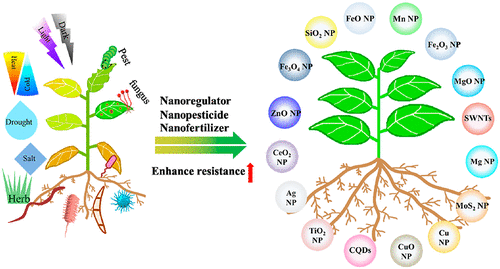当前位置:
X-MOL 学术
›
J. Agric. Food Chem.
›
论文详情
Our official English website, www.x-mol.net, welcomes your
feedback! (Note: you will need to create a separate account there.)
Nano-Biotechnology in Agriculture: Use of Nanomaterials to Promote Plant Growth and Stress Tolerance.
Journal of Agricultural and Food Chemistry ( IF 5.7 ) Pub Date : 2020-02-06 , DOI: 10.1021/acs.jafc.9b06615 Lijuan Zhao 1 , Li Lu 1 , Aodi Wang 1 , Huiling Zhang 1 , Min Huang 1 , Honghong Wu 2, 3 , Baoshan Xing 4 , Zhenyu Wang 5 , Rong Ji 1
Journal of Agricultural and Food Chemistry ( IF 5.7 ) Pub Date : 2020-02-06 , DOI: 10.1021/acs.jafc.9b06615 Lijuan Zhao 1 , Li Lu 1 , Aodi Wang 1 , Huiling Zhang 1 , Min Huang 1 , Honghong Wu 2, 3 , Baoshan Xing 4 , Zhenyu Wang 5 , Rong Ji 1
Affiliation

|
Sustainable agriculture is a key component of the effort to meet the increased food demand of a rapidly increasing global population. Nano-biotechnology is a promising tool for sustainable agriculture. However, rather than acting as nanocarriers, some nanoparticles (NPs) with unique physiochemical properties inherently enhance plant growth and stress tolerance. This biological role of nanoparticles depends on their physiochemical properties, application method (foliar delivery, hydroponics, soil), and the applied concentration. Here we review the effects of the different types, properties, and concentrations of nanoparticles on plant growth and on various abiotic (salinity, drought, heat, high light, and heavy metals) and biotic (pathogens and herbivores) stresses. The ability of nanoparticles to stimulate plant growth by positive effects on seed germination, root or shoot growth, and biomass or grain yield is also considered. The information presented herein will allow researchers within and outside the nano-biotechnology field to better select the appropriate nanoparticles as starting materials in agricultural applications. Ultimately, a shift from testing/utilizing existing nanoparticles to designing specific nanoparticles based on agriculture needs will facilitate the use of nanotechnology in sustainable agriculture.
中文翻译:

农业中的纳米生物技术:使用纳米材料促进植物生长和胁迫耐受性。
可持续农业是满足迅速增长的全球人口不断增长的粮食需求的努力的关键组成部分。纳米生物技术是可持续农业的有前途的工具。但是,某些具有独特理化特性的纳米颗粒(NP)并非充当纳米载体,而是从本质上增强了植物的生长和胁迫耐受性。纳米颗粒的这种生物学作用取决于其理化特性,施用方法(叶面输送,水培,土壤)和所施加的浓度。在这里,我们回顾了纳米颗粒的不同类型,性质和浓度对植物生长以及各种非生物(盐度,干旱,高温,高光和重金属)和生物(病原体和草食动物)胁迫的影响。还考虑了纳米粒子通过对种子萌发,根或芽生长以及生物量或谷物产量产生积极影响而刺激植物生长的能力。本文提供的信息将使纳米生物技术领域内外的研究人员能够更好地选择合适的纳米颗粒作为农业应用中的起始材料。最终,从测试/利用现有的纳米颗粒到根据农业需求设计特定的纳米颗粒的转变将促进纳米技术在可持续农业中的应用。
更新日期:2020-02-07
中文翻译:

农业中的纳米生物技术:使用纳米材料促进植物生长和胁迫耐受性。
可持续农业是满足迅速增长的全球人口不断增长的粮食需求的努力的关键组成部分。纳米生物技术是可持续农业的有前途的工具。但是,某些具有独特理化特性的纳米颗粒(NP)并非充当纳米载体,而是从本质上增强了植物的生长和胁迫耐受性。纳米颗粒的这种生物学作用取决于其理化特性,施用方法(叶面输送,水培,土壤)和所施加的浓度。在这里,我们回顾了纳米颗粒的不同类型,性质和浓度对植物生长以及各种非生物(盐度,干旱,高温,高光和重金属)和生物(病原体和草食动物)胁迫的影响。还考虑了纳米粒子通过对种子萌发,根或芽生长以及生物量或谷物产量产生积极影响而刺激植物生长的能力。本文提供的信息将使纳米生物技术领域内外的研究人员能够更好地选择合适的纳米颗粒作为农业应用中的起始材料。最终,从测试/利用现有的纳米颗粒到根据农业需求设计特定的纳米颗粒的转变将促进纳米技术在可持续农业中的应用。





















































 京公网安备 11010802027423号
京公网安备 11010802027423号